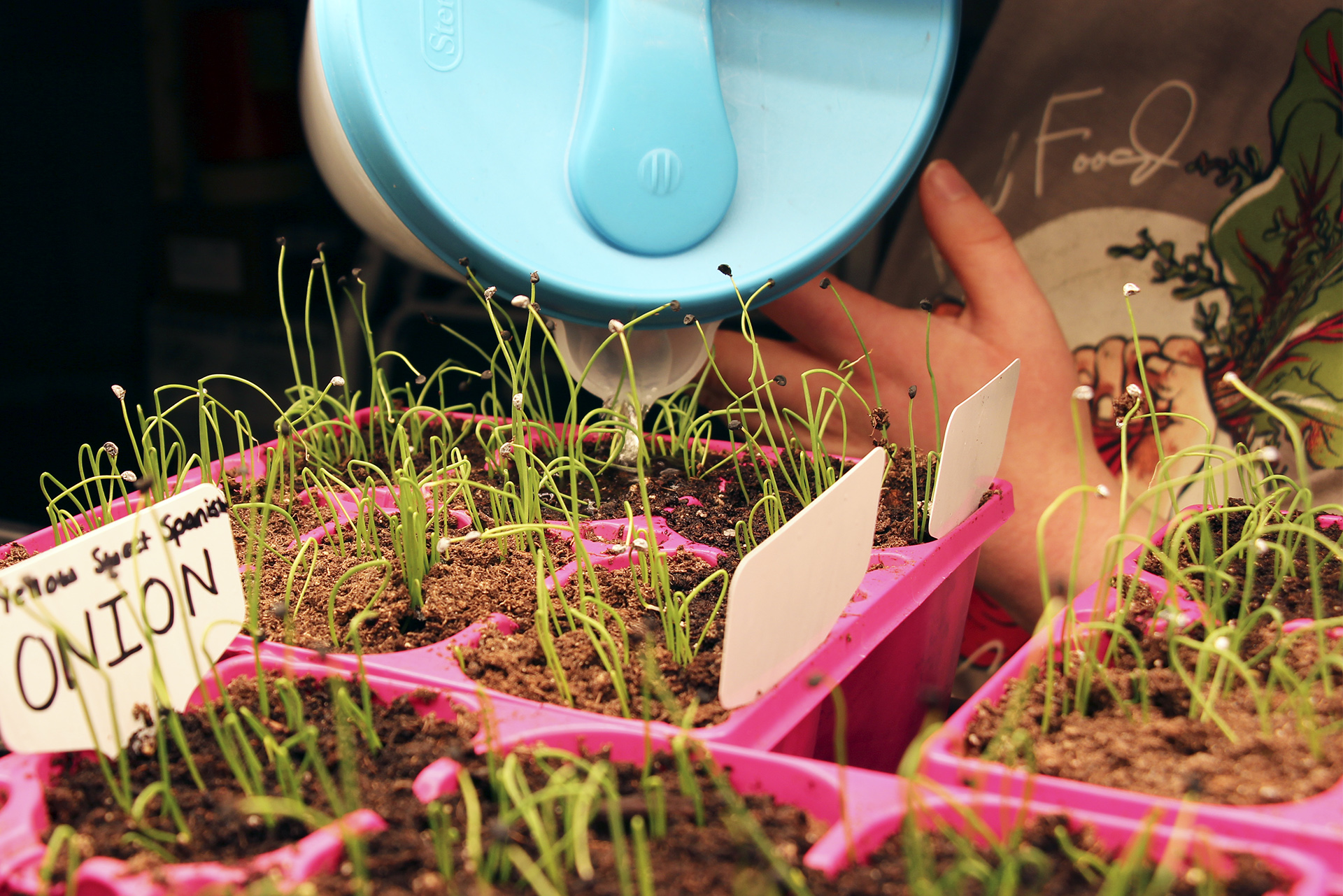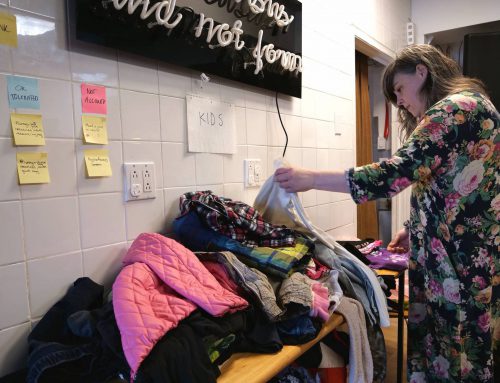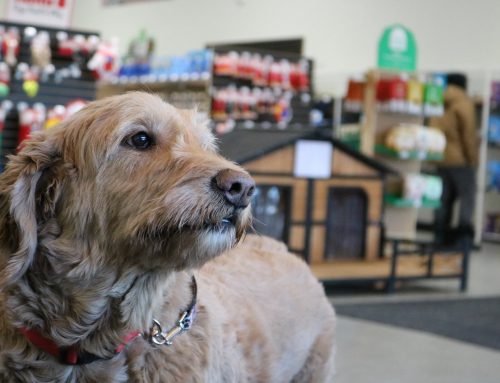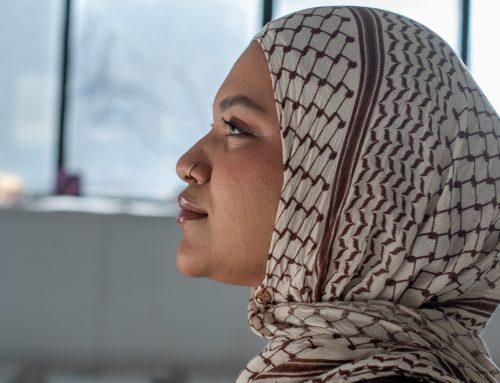BY Mackenzie Chandler & Hunter Walwaski
Rhiannon Clark has wanted to start a home vegetable garden for years. Recently, she decided to invest her time and money into creating her first indoor grow system and full backyard garden.
“It’s something that I’ve always wanted to do and it’s always been ‘I’ll do it another year’ or ‘I want a certain set up so I’ll just push it off’ but this year was the year I was going to get started,” she says.
In 2021, Clark bought a metal shelving unit, grow lights, fans, and seedling trays to grow her vegetables indoors. This gives her an early start to the season.
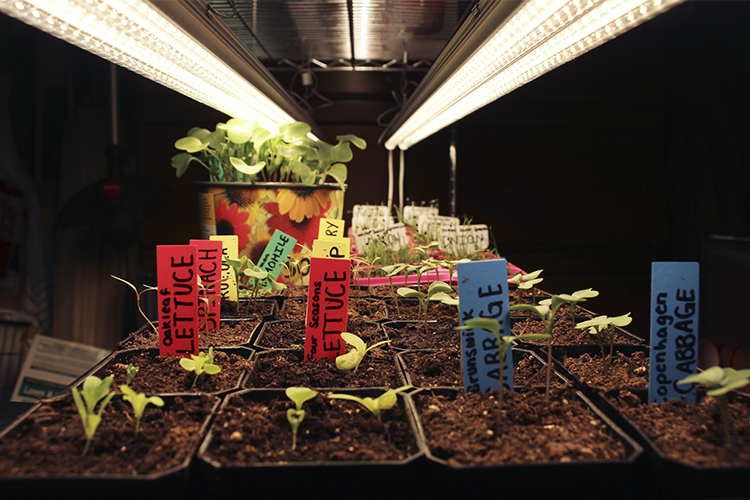
Rhiannon Clark’s new seedlings, grown in her basement using grow lights, seedling trays, and fans. Photo by Mackenzie Chandler.
Once it’s warm enough, Clark transfers her indoor plants outside into fabric grow bags, vertical planters, plastic buckets, and even dog swimming pools. This allows her to have a larger growing space and movability while not relying on her neighbourhood’s soil quality.
“My grow space is directly where a pool was, so it’s full of sand and gravel, so I couldn’t do it in the ground. The cost of building raised beds wasn’t going to be feasible in the timeline I wanted to start growing my own things, so grow bags were the next best alternative,” says Clark.
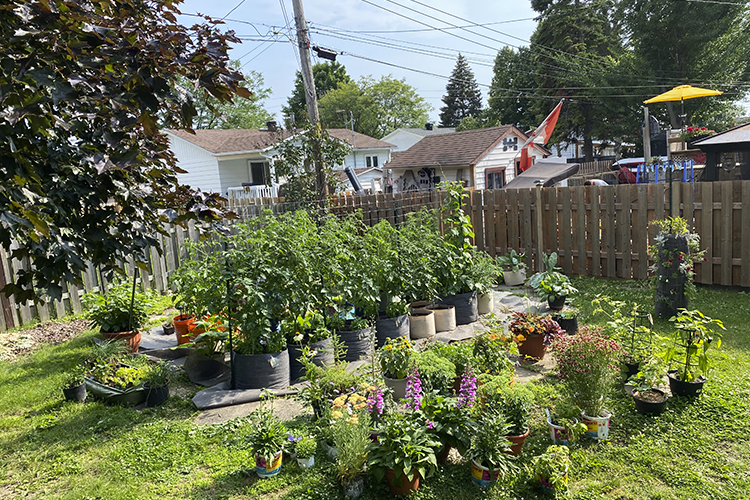
Rhiannon Clark’s backyard garden, where her produce grows out of different types of containers like grow bags and buckets with a homemade trellis for her tomatoes to grow onto. Photo provided by Rhiannon Clark.
Clark is among a large number of people who decided to start home gardening when the pandemic hit. A study conducted by the Agri-Food Analytics Lab at Dalhousie University found that 51 per cent of Canadians grow at least one kind of fruit or vegetable in a garden. Of those, almost one in five started since 2020. Over half of new gardeners say the pandemic has been the largest influence for starting their home garden.
Graphic of the Agri-Food Analytics Lab statistics. Created by Hunter Walwaski.
McGill professor David Wees, who specializes in urban horticulture, greenhouse management, and vegetable and fruit crops, has noticed the growth of interest in home gardening. He says gardening gave people something to do while stuck indoors during lockdowns.
“It sort of came as a shock in the first year of the pandemic when my wife and I went to the garden center to buy vegetable transplants and they were sold out of almost everything,” Wees says. “I’ve spoken to a couple greenhouse operators who grow vegetable transplants and they’re saying they’re having trouble keeping up with demand. The same thing is true with seed companies. Last winter, we wanted to order seeds for our home garden and two of the seed companies that we normally order from had temporarily shut down their websites because they were getting too much traffic.”
With this new boom in urban gardening comes a paralell boom for its infrastructure. Businesses surrounding home gardening have seen an influx in sales and interest since the pandemic. As well, new businesses are opening around Montreal to help feed this demand.
Gardening infrastructure booms to supply a new urban gardening wave caused by the pandemic. Video by Hunter Walwaski.
Alongside the growing popularity of home gardens, comes an interest in community gardens, giving home growers another outlet for their green thumbs. Dr. Caroline Begg, coordinator of the McDonald Community Garden, says that community gardens give people the opportunity to try the hobby before investing in a home garden.
“We have 64 plots and now we generally have a waiting list to get in. Five years ago, you could have a second plot because there just weren’t enough people interested,” says Begg.
On top of her coordinator work, she is also a board member for Corbeille de Pain, a West Island food security program. Recently there have been other groups interested in urban gardening.
“We’ve seen a growing interest on the part of churches, schools, or people with space who want to provide an opportunity to members to start a garden and grow food,” says Begg.
Food safety, food security, budget, and sustainability all tie into a person’s motivation for starting a home garden. Wees, however, doesn’t think COVID-19 is the only reason for this growing trend. He says the interest in urban gardening started pre-pandemic.
“People want to have a bit more control over their food supply. Part of it is environmental concerns, so saying ‘well I’m not sure how this food is being produced, is it being produced according to my values and if not then maybe I should be doing it myself’. There’s also been the local food movement, you can’t be much more local than growing it in your own yard,” Wees explains.
This was similar to Clark’s motivation for starting her backyard garden. She wanted to provide her family with organic, chemical-free produce on a limited budget.
“I can’t afford organic produce at the grocery store, it’s too overpriced, and being able to grow my own throughout the season is a huge benefit,” says Clark.
With her garden’s success, she rarely had to purchase certain vegetables, like tomatoes, lettuce, broccoli or squash. This season she is doubling her growing space to have more fresh produce for her family and to donate any extra to local food banks.
“The greatest feeling last year was when I weighed how many tomatoes I had and it was over six pounds of cherry tomatoes. Meanwhile, that would’ve cost $18 at the grocery store and it didn’t cost anywhere near that to produce. Other than my time and the resources I needed, the cost ends up being pennies,” says Clark.
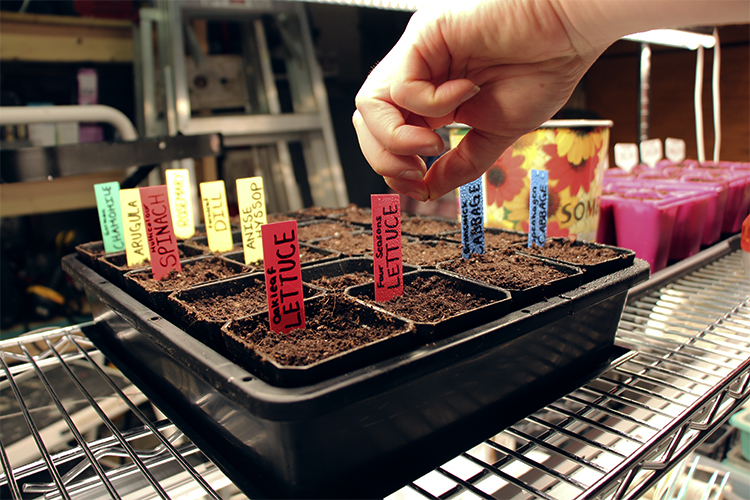
Slideshow of Rhiannon Clark’s process of starting her plants indoors. Photos by Mackenzie Chandler.
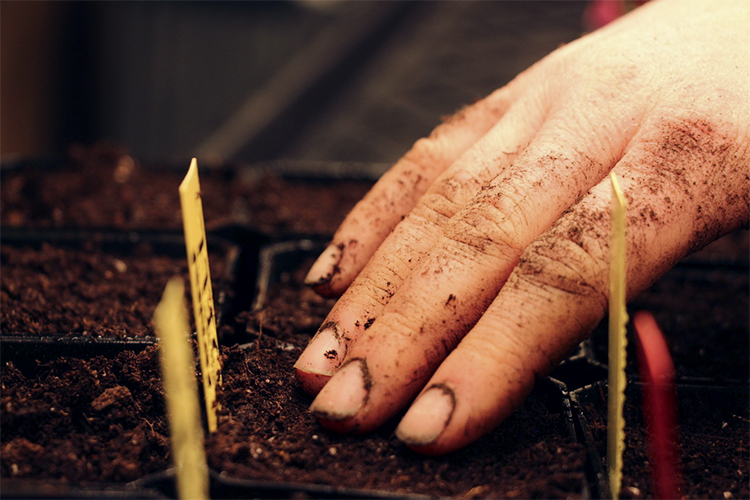
Slideshow of Rhiannon Clark’s process of starting her plants indoors. Photos by Mackenzie Chandler.
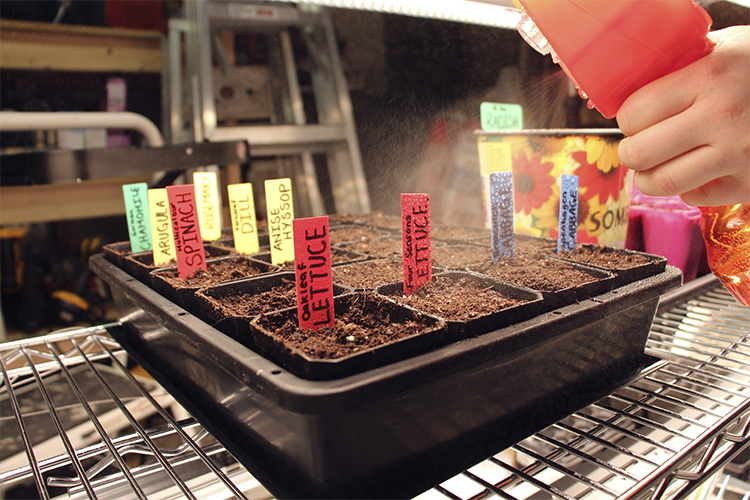
Slideshow of Rhiannon Clark’s process of starting her plants indoors. Photos by Mackenzie Chandler.
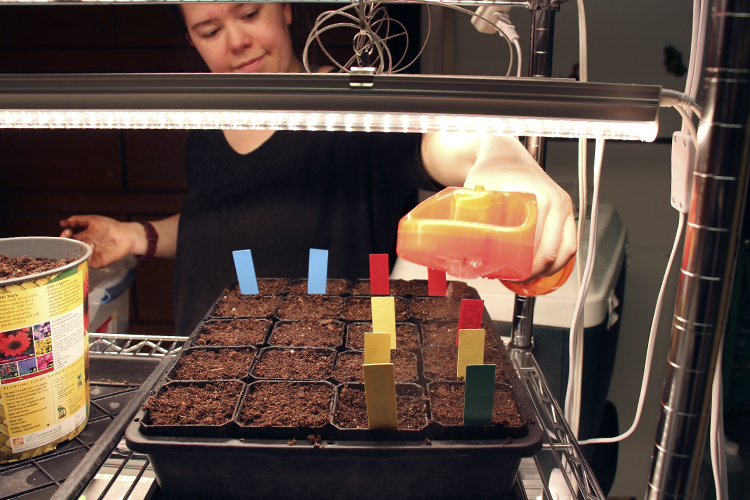
Slideshow of Rhiannon Clark’s process of starting her plants indoors. Photos by Mackenzie Chandler.
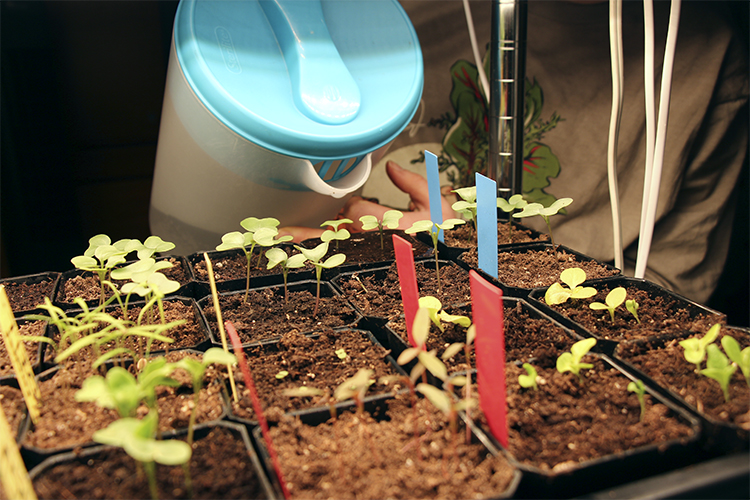
Slideshow of Rhiannon Clark’s process of starting her plants indoors. Photos by Mackenzie Chandler.
Philippe Guitor is a balcony grower and agriculture worker. He has seen a growing interest in urban gardening since his studies at McGill University and Cégep de Victoriaville, where he studied farm management and biological agriculture respectively.
“At Victoriaville, it was the first year of the program because there was such a demand for it. People wanted to learn about urban gardening and there were also new businesses looking for education,” says Guitor.
Guitor grows out of different-sized containers he’s bought from local hardware stores or has acquired through working in community gardens. His goal is to grow enough produce for his girlfriend and him while being as sustainable and local as possible. He buys his seeds from Terre Promise, a seed farmer in Île Bizard who provides seed bundles specifically for balcony growers.
“They know what varieties go well on balconies. They’re usually easier to grow and have a bigger amount of harvest for a smaller plant since we don’t have a lot of space,” says Guitor.
Guitor started his balcony garden late in the 2021 growing season. He had just moved into his apartment and although he didn’t have a lot of growing time, by mid-July he had a fully bloomed garden.
“You start tripping over stuff. It was a really big amount of containers so our tables and chairs were hard to reach. At a certain point, we just stopped going there because there were just too many plants. It’s not something that we would change; next year it’s going to be the same thing with the same amount of plants,” says Guitor’s girlfriend, Helen Kolokotronis, who knew nothing about urban gardening or community gardens until she met Guitor.
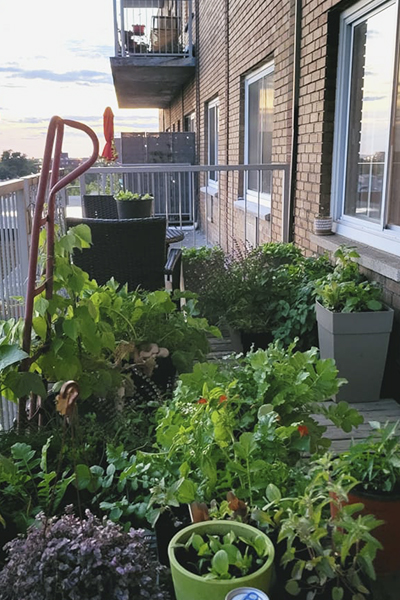
Philippe Guitor’s outdoor garden, located on his balcony in NDG. Guitor grows his produce out of buckets and various sized pots. Photo provided by Philippe Guitor.
Guitor has spent several growing seasons at community gardens throughout Montreal. He believes that access to not only fresh produce, but to education, is important and helps promote home gardening. One of his most recent jobs was in Ville Saint-Pierre, where a new project taught community members how to grow an urban garden.
“My role as a gardener was to teach and help people through the planting, growing, maintenance, and harvesting process. Then we would sell the produce at markets throughout Lachine and also at the small market in Ville Saint-Pierre. The rest was given to the growers,” Guitor says.
Guitor now works for Lufa Farms, an urban agricultural company, keeping his passion for gardening strong. He’s hoping to have an indoor seedling system much like Clark’s for future seasons. For now, he continues to grow some herbs indoors during the winter and will start his balcony garden once temperatures stay above zero.
This timeline shows when to start growing some of Clark’s and Guitor’s favourite vegetables. Timeline by Mackenzie Chandler.
“I mean it’s amazing the things you learn through growing plants. Every plant will have a little thing that defines them, it’s an exchange, it’s like love,” says Guitor.
For Clark, her passion for gardening may not be her career yet, but she still believes that starting a home garden is worth the time and work.
“With anything that you do, there’s always failure that comes with it, and with it being my first season I expected much more failure than success. The joy of having that much success was awesome and just further fuels me going forward,” says Clark.
